新七年级上英语语法和练习复习.ppt
- 格式:pptx
- 大小:9.23 MB
- 文档页数:71
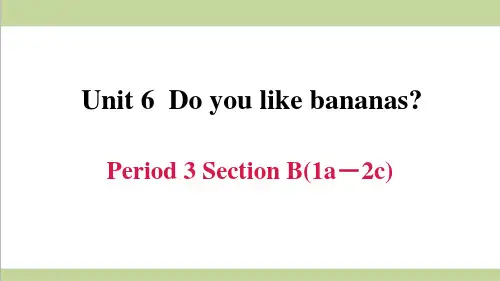
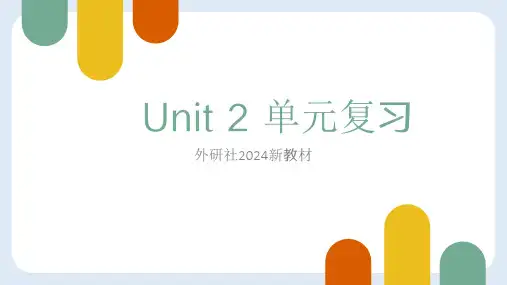
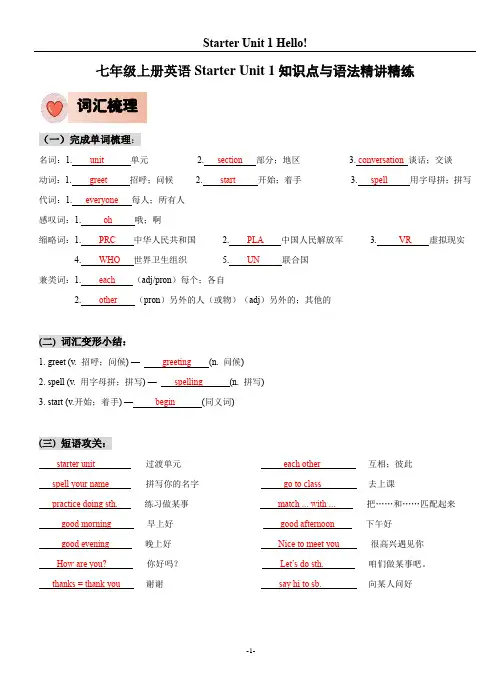
七年级上册英语Starter Unit 1知识点与语法精讲精练词汇梳理(一)完成单词梳理:名词:1. unit单元 2. section 部分;地区 3. conversation 谈话;交谈动词:1. greet 招呼;问候 2. start 开始;着手 3. spell 用字母拼;拼写代词:1. everyone 每人;所有人感叹词:1. oh 哦;啊缩略词:1. PRC 中华人民共和国 2. PLA 中国人民解放军 3. VR 虚拟现实4. WHO 世界卫生组织5. UN 联合国兼类词:1. each (adj/pron)每个;各自2. other (pron)另外的人(或物)(adj)另外的;其他的(二) 词汇变形小结:1. greet (v. 招呼;问候) — greeting (n. 问候)2. spell (v. 用字母拼;拼写) — spelling (n. 拼写)3. start (v.开始;着手) — begin (同义词)(三) 短语攻关:starter unit 过渡单元each other 互相;彼此spell your name 拼写你的名字go to class 去上课practice doing sth. 练习做某事match ... with ... 把……和……匹配起来good morning 早上好good afternoon 下午好good evening 晚上好Nice to meet you 很高兴遇见你How are you? 你好吗?Let’s do sth. 咱们做某事吧。
thanks = thank you 谢谢say hi to sb. 向某人问好1. 26个英文字母【用法详解】1. 重点:英语中一共有26 个英文字母,其中包括 5 个元音字母(Aa 、Ee 、Ii 、Oo 、Uu )和21个辅音字母。
2.大写字母的基本用法:(1)句子的开头;Eg.I went to the store yesterday. 我昨天去商店了。
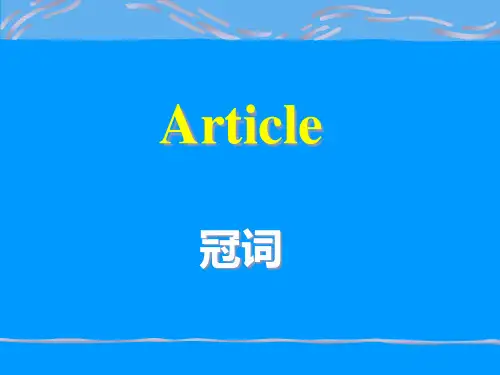
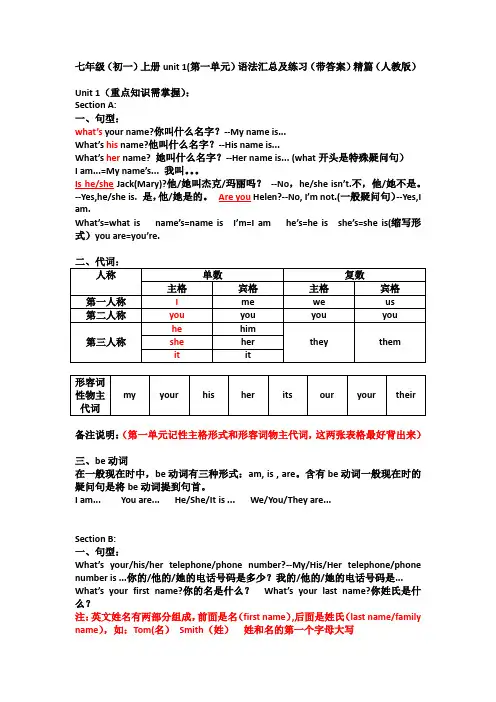
七年级(初一)上册unit 1(第一单元)语法汇总及练习(带答案)精篇(人教版)Unit 1(重点知识需掌握):Section A:一、句型:what’s your name?你叫什么名字?--My name is...What’s his name?他叫什么名字?--His name is...What’s her name? 她叫什么名字?--Her name is... (what开头是特殊疑问句)I am...=My name’s... 我叫。
Is he/she Jack(Mary)?他/她叫杰克/玛丽吗?--No,he/she isn’t.不,他/她不是。
--Yes,he/she is. 是,他/她是的。
Are you Helen?--No, I’m not.(一般疑问句)--Yes,I am.What’s=what is name’s=name is I’m=I am he’s=he is she’s=she is(缩写形式)you are=you’re.备注说明:(第一单元记性主格形式和形容词物主代词,这两张表格最好背出来)三、be动词在一般现在时中,be动词有三种形式:am, is , are。
含有be动词一般现在时的疑问句是将be动词提到句首。
I am... You are... He/She/It is ... We/You/They are...Section B:一、句型:What’s your/his/her telephone/phone number?--My/His/Her telephone/phone number is ...你的/他的/她的电话号码是多少?我的/他的/她的电话号码是... What’s your first name?你的名是什么?What’s your last name?你姓氏是什么?注:英文姓名有两部分组成,前面是名(first name),后面是姓氏(last name/family name),如:Tom(名)Smith(姓)姓和名的第一个字母大写作业练习一、根据中文默写英文单词。
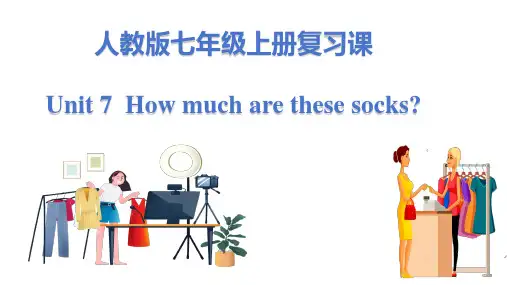
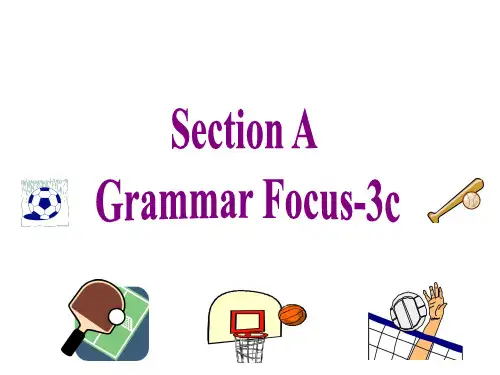
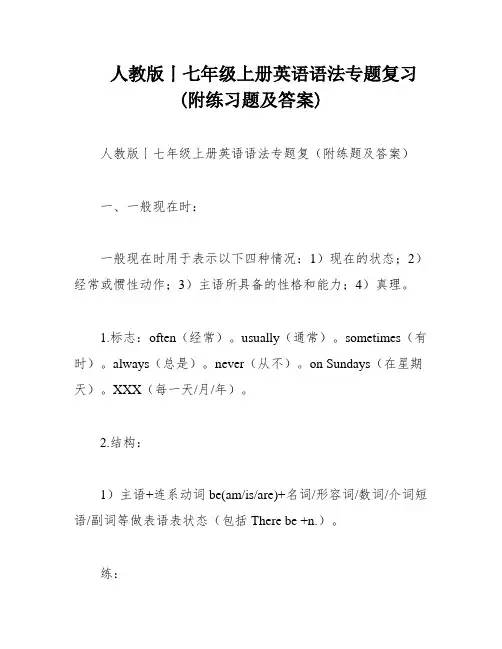
人教版丨七年级上册英语语法专题复习(附练习题及答案)人教版丨七年级上册英语语法专题复(附练题及答案)一、一般现在时:一般现在时用于表示以下四种情况:1)现在的状态;2)经常或惯性动作;3)主语所具备的性格和能力;4)真理。
1.标志:often(经常)。
usually(通常)。
sometimes(有时)。
always(总是)。
never(从不)。
on Sundays(在星期天)。
XXX(每一天/月/年)。
2.结构:1)主语+连系动词be(am/is/are)+名词/形容词/数词/介词短语/副词等做表语表状态(包括There be +n.)。
练:1.I am a student。
My name is Tom.2.Where are my shoes。
They are here.3.Who is the girl with long straight hair。
I think she is Kate.4.You and I are not in Class Six.5.XXX。
Yes。
there is.6.XXX。
No。
they aren't.2)主语(非第三人称单数)+行为动词原形+其他(用助动词do帮助构成否定句、一般疑问句和特殊疑问)。
3)主语(第三人称单数)+行为动词的第三人称单数+其他(用助动词does帮助构成否定句、一般疑问句和特殊疑问句)。
行为动词第三人称单数加-s的形式:1.-s2.辅音+y: study-studies3.以s,x,ch,sh结尾: watch-watches。
XXX4.特殊: have-has。
do-does。
go-goes。
练:1.His parents watch TV every night.肯定句:1.XXX.否定句:2.His parents do not watch TV every night.n: My brother does not do homework every day。
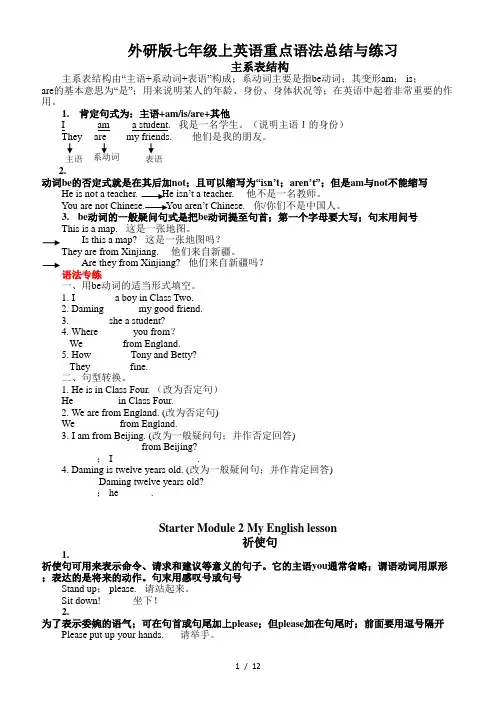
外研版七年级上英语重点语法总结与练习主系表结构主系表结构由“主语+系动词+表语”构成;系动词主要是指be动词;其变形am; is;are的基本意思为“是”;用来说明某人的年龄、身份、身体状况等;在英语中起着非常重要的作用。
1. 肯定句式为:主语+am/is/are+其他I am a student. 我是一名学生。
(说明主语I的身份)They are my friends. 他们是我的朋友。
主语系动词表语2.动词be的否定式就是在其后加not;且可以缩写为“isn’t;aren’t”;但是am与not不能缩写He is not a teacher. He isn’t a teacher. 他不是一名教师。
You are not Chinese. You aren’t Chinese. 你/你们不是中国人。
3. be动词的一般疑问句式是把be动词提至句首;第一个字母要大写;句末用问号This is a map. 这是一张地图。
Is this a map? 这是一张地图吗?They are from Xinjiang. 他们来自新疆。
Are they from Xinjiang? 他们来自新疆吗?语法专练一、用be动词的适当形式填空。
1. I _______ a boy in Class Two.2. Daming ______ my good friend.3. _______ she a student?4. Where ______ you from?We _______ from England.5. How _______ Tony and Betty?They _______ fine.二、句型转换。
1. He is in Class Four. (改为否定句)He ________ in Class Four.2. We are from England. (改为否定句)We ________ from England.3. I am from Beijing. (改为一般疑问句;并作否定回答)_______ ________ from Beijing?_______; I _______ _________.4. Daming is twelve years old. (改为一般疑问句;并作肯定回答)_______ Daming twelve years old?_______; he ______.Starter Module 2 My English lesson祈使句1.祈使句可用来表示命令、请求和建议等意义的句子。
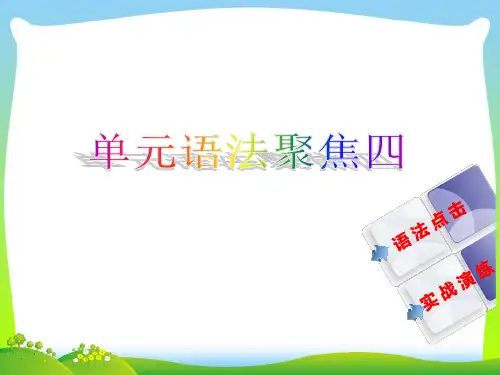
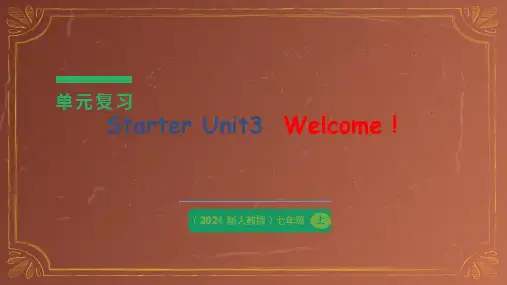
I prefer the cheaper one of the two books.Of the two brothers, he is the cleverer.课堂练习之形容词副词比较级最高级用所给词的正确形式填空:1. Of the two girls, I find Lucy the _______ (clever).2. Gold(黄金) is ______ (little) useful than iron(铁).3. My sister is two years _______ (old ) than I.4. John’s paren ts have four daughters, and she is the _____ (young) child.5. The short one is by far _______ (expensive) of the five.6. Dick sings _____ (well), she sings ______(well) than John, but Mary sings______(well) in her class.7. She will be much ______ (happy) in her mew house.1. cleverer2.less3.older4.youngest5.the most expensive6.well, better, best7.happier单项选择1. The population of the world in 20th century became very much _________ than that in 19th.A. biggerB. largerC. greaterD. more2. Miss Li is one of _______ in our school.A. a popular teacherB. more popular teacherC. most popular teacherD. the most popular teachers3. The magazines are ________ easy that the children can read them well.A. suchB. soC. tooD. very4.—— Would you like ________ more tea?——Thank you. I’ve had ________.A. any, muchB. some, enoughC. some, muchD. any, enough5. I think basketball is _______. I like to watch it.A. boringB. boredC. excitingD. excited6. This dinner looks _______ to me, and I like it.A. terribleB. goodC. badlyD. nicely7. The math problem is so hard that ________ students can work it out.A. a fewB. a littleC. manyD. few8.——What’s the weather like tomor row?—— The radio says it is going to be even ______.A. badB. worstC. badlyD. worse9. Though she talks ______, she has made ________ friends here.A. a little, a fewB. little, few2) Don’t look out of the window.Sorry, I won’t.课堂练习之祈使句一.单项选择1. The TV is too loud. Please ________.A. turn it downB. to turn it downC. turn down itD. to turn down it2. _______ late again, Bill!A. Don't to beB. Don't beC. Not beD. Be not3. _______ cross the road until the traffic lights turn green.A. NotB. Won'tC. Doesn'tD. Don't4. Please help me carry it, ______?A. will IB. will youC. shall ID. shall we5. Don't make so much noise, ______?A. will youB. won't youC. shall weD. do you6. Kate, _______ your homework here tomorrow.A. bringB. bringsC. to bringD. bringing7. ________ me the truth, or I'll be angry.A. TellingB. To tellC. ToldD. Tell8. ______ go for the book alone, Mrs Zhang.A Let’sB Let meC LetusD Allow10. John, read the text for us,________?A does heB will heC do youD will you9.Let’s do it at once, ________ ?A shall weB will youC do weD do you10. Let us do it at once, ________ ?A shall weB will youC do weD do you11. _____ this kind of peach, and you will like it.A. To tryB. TryingC. TryD. Tried12. _____ the radio, please. The baby is sleeping now. 、A. Not turn onB. Don’t turn onC. Not turn downD. Don’t turn down13. —______ late for school again, Tim! —Sorry, I promise that I ______.A. Don’t;won’tB. Don’t be; won’tC. Don’t be; don’tD. Don’t; will14. Boys and girls, ______ up your hands if you want to go for a picnic this weekend.A. puttingB. to putC. putD. puts二. 句型转换1). If you don't listen to me, I'll go. (改为同义句)_____ _____ me, or I'll go.2). let’s watch the sports games. (改为反意疑问句)Let's watch the sports games, _____ _____?3).The teachers often tell the students not to be careless.(改为祈使句)_____ _____careless, please.4). Please sit next to Nancy. (改为否定句)_____ _____ next to Nancy.5). Don't forget to turn off the lights, please.(改为反意疑问句)Don't forget to turn off the lights, _____ _____?6). If you move, you'll die. (改为同义句)_____ _____, or you'll die.7). Come to my house tomorrow. (改为反意疑问句)Come to my house tomorrow, _____ _____?Keys: 1) listen to, 2) shall we 3) Don’t be 4) Don’t sit 5) will you 6) Don’t move 7) will you 语法点三:if 条件句和unless 条件句1)If条件句:在表示将来可能发生的事情的if条件句中,主句用一般将来时,而if从句用一般现在时表示将来的时间,即主将从现Eg.If I like the house, I will buy it. 如果我喜欢这房子,我就会把它买下I will tell her if I see her. 如果我见到她,我就会告诉她。
人教版英语七年级上册重点语法1.大写字母的用法:①在英语中,句子的第一个单词的第一个字母都应大写。
Good morning, Alice! 早上好,艾丽斯!②字母I作人称代词时,意为“我”,在句中任何位置都必须大写。
日常用语“OK”在句中任何位置都大写③人名、地名、国名、某国人或某种语言等专有名词的第一个字母都必须大写。
④表示月份、星期、重要节日的名词的第一个字母必须大写。
电影名、书名、报刊、文章的标题等中的每一个实词(如:名词、动词、形容词、副词、数词)的第一个字母一般大写。
某些缩略词的每一个字母都必须大写。
RMB 人民币 CCTV 中国中央电视台2.不定冠词a / an/the 的用法an用在以元音因素开头的单词或者字母前(读音)an orange一个橘子, an eraser一块橡皮 an ID card一张身份证 an uncle 一位叔叔, an aunt一位阿姨, an apple 一个苹果 an art lesson 一节美术课an hour 一小时a用在以辅音音因素开头的单词或者字母前(读音)a UFOThe是定冠词,表示特指的人、物或群体,起作用有时相当于指示代词this, that, these, those,表示“这(个),那(个),这些,那些”。
它可以用在名词前,表示特指说话双方的人或者上文中提到的人或者事物。
(1)特指说话双方都知道的人或事物。
Where is the ruler?尺子在哪里?(2)指上文中提到的人或事物。
This is a pen. The pen is black.这是一支钢笔。
这支钢笔是黑色的。
(3)用在世界上独一无二的事物前。
the sun 太阳 the earth 地球 the moon 月亮 the world 世界(4)和某些形容词连用,表示一类人。
the old 老人 the young 年轻人 the poor 穷人(5)用在方位名词前。